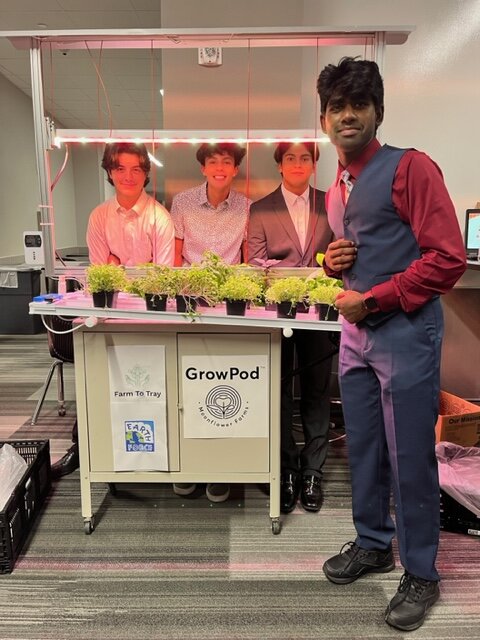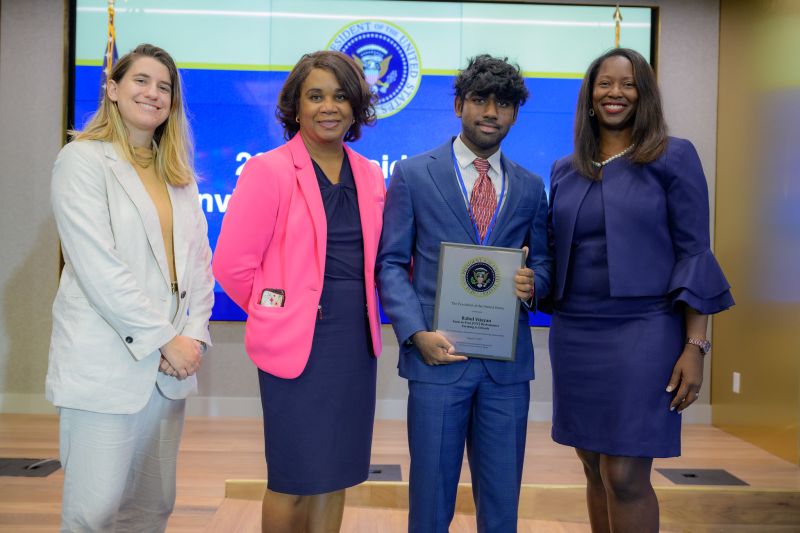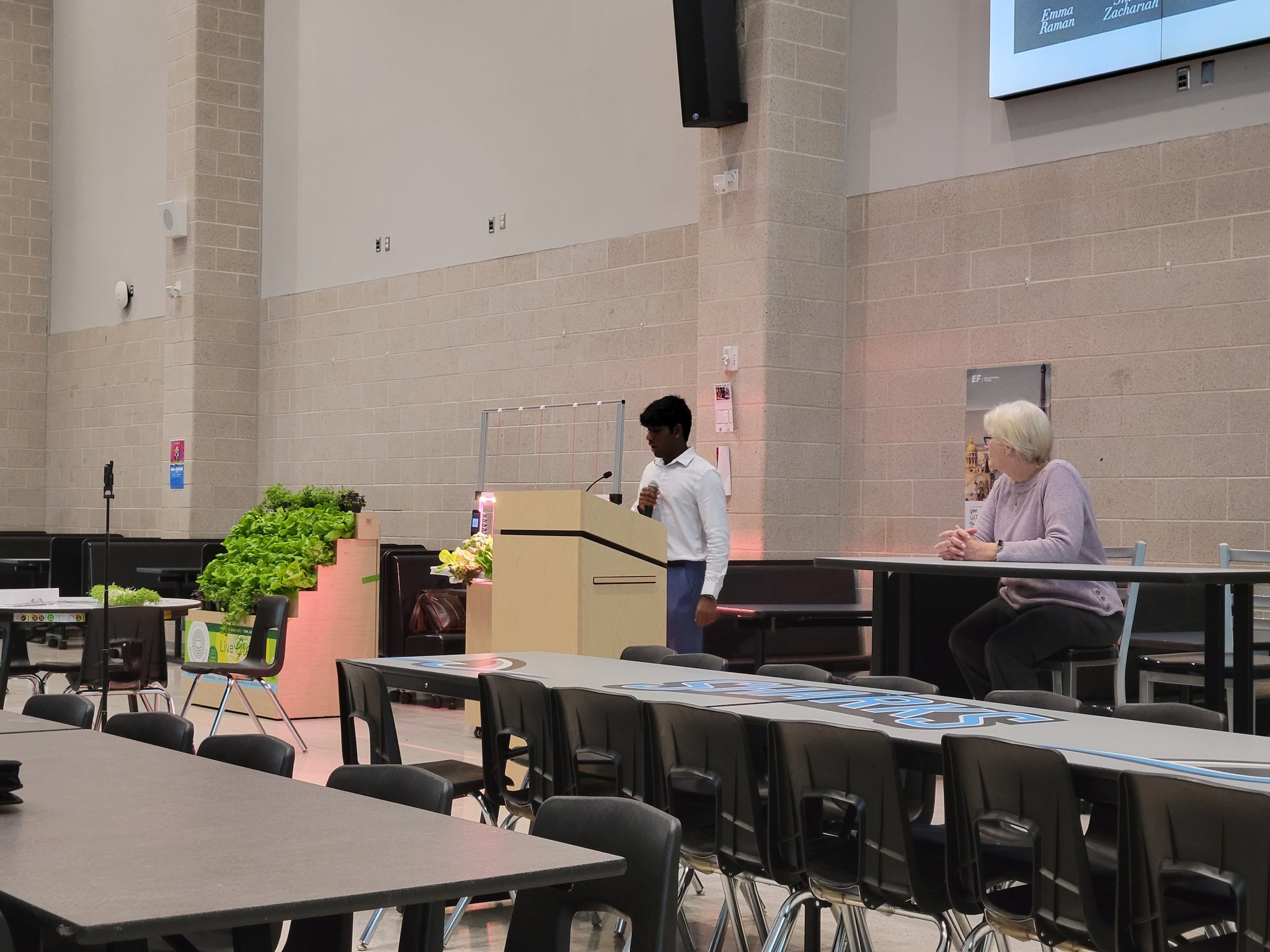(September 21, 2023) In an era marked by climate uncertainty, dwindling arable land, and a growing global population, the traditional methods of agriculture are facing unprecedented challenges. However, a beacon of hope shines through the innovative and sustainable practice of hydroponics, which is poised to revolutionise the way we grow food. And pioneering this movement is a young Indian American agriculturist, Rahul Vijayan, a junior at Shadowcreek High School in Pearland, Texas, who recently won the prestigious President’s Environmental Youth Award (PEYA), 2023. At just 16, this Global Indian has established the nonprofit organisation, called ‘ Farm to Tray’, to enhance access to fresh organic produce in Houston-area schools.

“The problem I am seeking to fix is poor child nutrition in American public schools,” the agriculturist expressed, adding, “Most students in the USA receive about one-third of the nutrition from unhealthy lunches and breakfasts served in schools. However, I feel that food quality is only the tip of the iceberg; a lack of proper nutrition is detrimental to everything. Students have yet to be taught proper nutritional habits from a young age.”
Talking about being recognised by the US President for his efforts, he said, “I’m truly honoured, especially being so invested in sustainability and nature and climate change. I always love finding peers who are in the same field as me. I’m even trying to connect with some students there to bring hydroponics to their school and bring some of their projects to mine.”
Food for all
The youngster, who has always been fascinated by newer technology and developing alternative methods to help people, embarked on his hydroponic farming journey in 2021 when he interned at Moonflower Farms, a large 20,000-square-foot sustainable greenhouse situated at 3905 Fuqua in Houston. Around the same time, Federico Marques, the CEO and founder of Moonflower Farms, collaborated with Vijayan to introduce hydroponic farming into schools, starting with Shadow Creek High School earlier this year. Their joint efforts resulted in the development of two systems: one, a six-by-four-foot hydroponic farm, allows students to cultivate crops like tomatoes, lettuce, mint, basil, and peppers; the second is a grow kit designed as a small, hands-on laboratory to introduce hydroponics to younger students at the elementary school level.
In 2022, Rahul Vijayan received a $3,200 grant from Earthforce, which funded the creation of the inaugural hydroponic farm in the advanced placement environmental science curriculum at Shadow Creek High School. This hydroponic system has successfully completed six cycles of produce growth. Subsequently, in January, he organised a symposium that inspired teachers throughout Alvin ISD to explore the integration of hydroponic farming into their classrooms. “I realised how big the market is and how teachers actually value this new tool and way of teaching students in a new, fun way,” the agriculturist said.
Rahul Vijayan collaborated with the Children’s Environmental Literacy Foundation to supervise hydroponic farming practices in 49 schools spanning Texas, California, New York, and Connecticut. “I’m trying to expand it to more classes and curriculums to utilise this form of handheld teaching and project-based learning,” the youngster said.


Apart from this, the 16-year-ols is also working on expanding the farming area in Houston. Interestingly, the oncology department at Houston Methodist Hospital in the Texas Medical Center has embraced Rahul’s hydroponic farming techniques to establish a therapeutic garden for cancer patients. “Seeing these plants grow right next to them in their bedsite and eating fresh produce really helps boost morale and recovery,” the agriculturist said.
The road ahead
Rahul’s project combines technology and community responsibility. His efforts involve practical assessments to determine the optimal garden size, and his use of hydroponic technology eliminates the need for genetically modified organisms (GMOs) or pesticides, all while conserving space and water. Not only has the agriculturist introduced this technology to his community, but he also encourages others to embrace it. “I will continue to work on this project for a long time to come,” he said, “My goal, although it’s rather ambitious, is to have every American public school utilise hydroponic infrastructure to curb this problem of nationwide poor nutrition in schools.”


Rahul Vijayan has put together a first-of-its-kind hydroponic symposium
The agriculturist is currently collaborating with the City of Pearland, Kroger grocery stores, and even NASA to share the benefits of his project with a broader audience. Moreover, he plans to establish new gardens in other schools, with a comprehensive seven-step plan for hydroponic implementation across school districts and states. His garden and teachings serve as an inspiration for others to incorporate fresh, organic produce into school lunches while instilling the principles of sustainable agriculture in the student curriculum.


“Eventually, I want my school’s student body to run the programme within the environmental club. The produce generated by this cultivation would be used in the school cafeteria system. I plan to expand to eight already interested schools by March next year in my district alone. Although in parallel, I am working with schools and teachers from Ghana, India, and other US states,” said the agriculturist.




